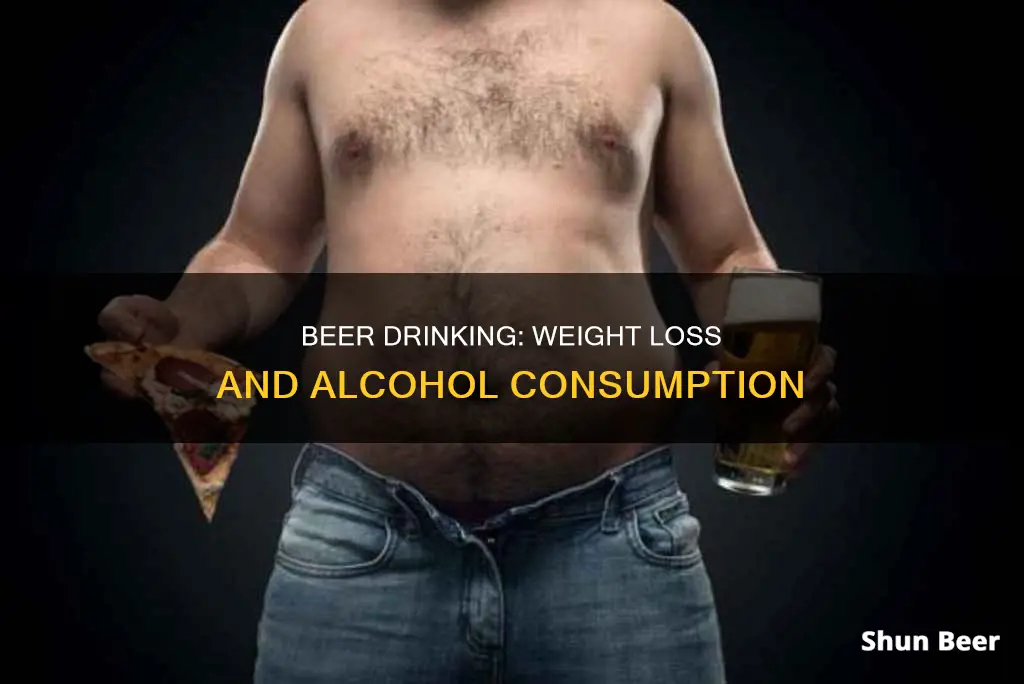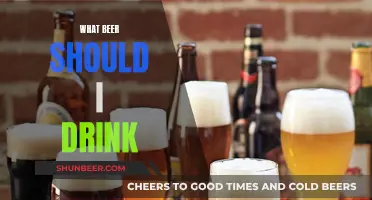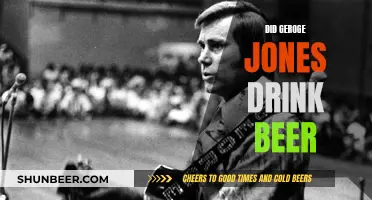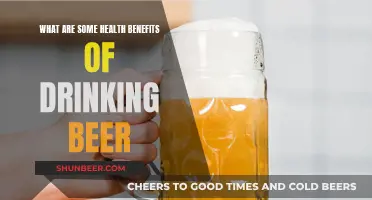
Beer is a popular alcoholic drink, but it can be challenging to manage weight while consuming it regularly. Beer contributes a lot of calories, and it is difficult to determine which beers are high or low in calories as this information is not always available. Beer also negatively affects sleep and can inhibit self-control, making it harder to stick to a diet. However, drinking beer in moderation and making some dietary and lifestyle changes can help with weight loss. Strategies include drinking less frequently, reducing portion sizes, and choosing lower-calorie options.
| Characteristics | Values |
|---|---|
| Calories | Beer provides calories without satisfying hunger. |
| --- | Beer is an "empty calorie" as it provides almost no nutrients. |
| --- | Beer is a liquid, meaning it is easy to consume calories quickly. |
| --- | Alcohol is metabolised differently by the body compared to other macronutrients like protein, carbs and fat. |
| --- | Beer contains varying amounts of calories depending on the brand and type. |
| --- | Regular Budweiser contains about 40% more calories than Bud Light. |
| Sleep | Alcohol can negatively impact sleep quality. |
| --- | Poor sleep is directly linked to weight gain and muscle loss. |
| --- | Sleep-deprived people experience an increase in appetite for high-carb, calorie-dense foods. |
| Self-control | Alcohol inhibits self-control, which can lead to making poorer food choices. |
| Appetite | Alcohol can enhance appetite and increase the pleasure of eating. |
| Fat oxidation | Alcohol may impact fat oxidation, leading to higher body fat in the long run. |
| Healthy alternatives | Light beers, low-sugar wines (e.g. Pinot Noir), spirits with low-calorie mixers. |
What You'll Learn
- Beer is an empty calorie with no nutrients, but it's possible to drink beer and lose weight
- Alcohol impacts sleep quality, which can lead to weight gain
- Alcohol increases appetite and cravings for high-fat, savoury foods
- Alcohol changes how your body burns fat, prioritising it over other nutrients
- Alternate alcoholic drinks with water to stay hydrated and pace your drinking

Beer is an empty calorie with no nutrients, but it's possible to drink beer and lose weight
Beer is often referred to as ""empty calories"" because it provides almost no nutrients and can hinder weight loss. Beer is a liquid, which means you can drink calories very quickly, and it contains alcohol, which is metabolised differently by the body compared to other macronutrients. Alcohol can stop the process of fat burning and affect your sleep, both of which can lead to weight gain.
However, it is possible to drink beer and still lose weight. The key is moderation and being strategic about your beer intake. Here are some tips to help you enjoy a beer while losing weight:
- Limit the number of beers you drink per week. The fewer beers you consume, the fewer empty calories you ingest.
- Choose light or low-ABV beers. These beers have a lower alcohol content, which typically means fewer calories.
- Reduce your portion size. Opt for a smaller glass or choose a 12-ounce can instead of a 16-ounce bottle.
- Drink less frequently. For example, you could limit your beer consumption to weekends only.
- If you're cutting carbs, select lower-carb beers. Examples include Michelob Ultra, Budweiser Select 55, and Corona Premier.
- Alternate alcoholic drinks with glasses of water. This will help you stay hydrated and may reduce the number of beers you drink.
- Avoid high-fat or high-calorie meals while drinking beer. Alcohol provides plenty of easy-to-access energy for your body, and combining it with fatty foods will result in excess energy that gets stored as fat.
- Be mindful of your drinking habits and adjust your eating habits accordingly. For example, if you're having a burger with a couple of beers, skip the fries and opt for lean protein sources and veggies instead.
Wisconson's Teen Beer Drinking Laws Explained
You may want to see also

Alcohol impacts sleep quality, which can lead to weight gain
Alcohol can negatively impact sleep quality, which can, in turn, lead to weight gain. While alcohol may help you fall asleep initially, even a couple of drinks can disrupt your sleep cycle and affect the quality of your sleep. This is because alcohol reduces the time spent in the important Rapid Eye Movement (REM) stage of sleep. As a result, you may wake up feeling less refreshed.
Several consecutive nights of poor sleep can have a significant impact on your overall health and daily functioning. Sleep deprivation is linked to weight gain, muscle loss, increased appetite for high-calorie foods, and reduced activity levels. It can also affect your mood, concentration, and decision-making abilities.
To minimize the impact of alcohol on your sleep, it is recommended to avoid consuming alcohol close to bedtime and to limit your overall alcohol intake. Giving your body enough time to process the alcohol before sleeping can help improve your sleep quality. Additionally, incorporating alcohol-free days into your routine can promote better sleep and overall physical and mental health.
Gallstones and Beer: A Dangerous Mix?
You may want to see also

Alcohol increases appetite and cravings for high-fat, savoury foods
Beer is the most popular alcoholic beverage in the US, with US consumers over 21 drinking 27.5 gallons of beer and cider per person in 2015. Beer is also a significant contributor to calories, which can make it challenging for those trying to manage their weight.
Drinking alcohol can stop the process of fat burning. Beer is an "empty calorie" because it provides almost no nutrients. Beer is a liquid, which means you can drink calories very quickly.
Research shows that there are several physiological reasons why you might feel hungrier after drinking alcohol. Alcohol suppresses the oxidation of fatty acids, which contributes to feelings of hunger as fatty acids play a role in appetite regulation. It also increases thermogenesis (calorie utilization causing heat production) in the short term, which means you may feel hungry again faster than usual.
Alcohol stimulates or inhibits neurochemical systems that play a role in appetite regulation. Researchers have noted that alcohol affects two primary hunger-regulating hormones: Leptin and GLP-1. These hormones suppress appetite and are either directly or indirectly inhibited when alcohol enters the body. As a result, you start feeling hungry after a few drinks, even if you are actually “full.”
Alcohol also stimulates the same neurons in the brain that are triggered when the body goes into starvation mode. This stimulation could even lead to ethanol-induced overeating.
It is especially common to experience cravings for certain junk foods before, during, or after drinking alcohol. A study by Caton et al. (2004) showed that consumption of high-fat savoury foods (crisps) was higher after 4 units of alcohol, relative to 1 unit. Another study by Schrieks et al. (2015) found that moderate alcohol consumption increased the intake of high-fat savoury foods by 24%.
If you are trying to lose weight, it is recommended to reduce your alcohol intake by drinking less frequently, such as only on weekends, or choosing lower-calorie and lower-carb beers.
A Risky Mix: Beer and Benzonatate
You may want to see also

Alcohol changes how your body burns fat, prioritising it over other nutrients
Alcohol does indeed change how your body burns fat, prioritising it over other nutrients. This is because alcohol is calorie-dense, and so it is a more attractive energy source for the body. Your body treats alcohol like a poison, and so it shuts down all other metabolic pathways to focus on metabolising the alcohol. This means that alcohol will be metabolised preferentially over other nutrients.
The process of metabolising alcohol can take the body up to 36 hours, during which time no fat burning will take place. Alcohol is metabolised mostly in the liver, and this process can lead to physical changes in the liver, including fat accumulation. Alcohol also interferes with peripheral fat mobilisation, making it harder for the body to access stored fat for energy.
In addition to slowing down fat burning, alcohol can also negatively impact weight loss by increasing cravings for food, particularly high-carbohydrate, calorie-dense foods. Alcohol can also negatively affect sleep, which is linked to weight gain and muscle loss.
So, while it is possible to drink beer and still lose weight, it is more difficult to create a caloric deficit if you are consuming alcohol. If you are trying to lose weight, it is recommended to reduce your overall alcohol consumption, and to choose lower-calorie and lower-ABV drinks.
Trump's Beer: Drinking Habits of the Former President
You may want to see also

Alternate alcoholic drinks with water to stay hydrated and pace your drinking
Drinking beer can make losing weight challenging. Beer is an "empty calorie" drink, providing almost no nutrients, and it is in liquid form, which means you can drink calories very quickly. Beer also contains alcohol, which is metabolised by the body differently from other macronutrients like protein, carbs, and fat. Alcohol can stop the process of fat burning completely.
If you are trying to lose weight while still drinking beer, you can try reducing your portion size by using a smaller glass or choosing a 12-ounce can instead of a 16-ounce bottle. You can also drink less frequently, such as only on weekends.
To stay hydrated and pace your drinking, it is important to alternate alcoholic drinks with water. Here are some tips to help you:
- For every alcoholic drink you consume, drink a glass of water. This will help to keep the hangover headache away and space out your alcoholic drinks.
- Drink water before and with your meals. This will help regulate your hunger and aid digestion.
- Avoid carbonated mixers as they increase the rate of alcohol absorption in the blood. Instead, mix your liquor with fruit juice or water.
- If you are drinking something bubbly, alternate between alcoholic and non-alcoholic beverages.
- Dilute your drinks with ice or water to increase the time between refills and decrease your odds of a hangover.
- If you are drinking cocktails, order drinks that are on the rocks. As the ice melts, the drink will become diluted, and you will sip it more slowly.
- Avoid shots. Drinking straight liquor will make it harder to pace yourself.
- Eat something while you drink. Eating slows down the absorption of alcohol and gives your body more time to metabolise it. Opt for whole grains and polyunsaturated fats like omega-3 fatty acids, found in certain fish, nuts, and seeds.
- Be mindful of the type of alcohol you are consuming. Clear or light liquor contains fewer congeners (chemicals that contribute to the taste, smell, and colour of alcohol) than darker drinks.
Losartan and Beer: Is It Safe to Drink?
You may want to see also
Frequently asked questions
Yes, it is possible to drink beer and lose weight. However, it is harder to create a caloric deficit if you drink every day. Beer is an "empty calorie" drink as it provides almost no nutrients and can hinder your weight loss journey.
The key to drinking beer and losing weight is moderation. The Dietary Guidelines for Americans define moderate drinking as two or fewer standard drinks per day for men and one or fewer for women. A standard drink of beer is 12 fluid ounces of 5% ABV beer.
Here are some tips to enjoy beer while losing weight:
- Drink light or low % ABV beer.
- Reduce portion sizes by using a smaller glass or choosing a 12-ounce can instead of a 16-ounce bottle.
- Drink less frequently, such as only on weekends.
- Choose lower-carb beers.
- Alternate each beer with a glass of water to stay hydrated and pace your drinking.
- Eat a healthy meal before drinking to slow the absorption of alcohol and make wiser drinking choices.







